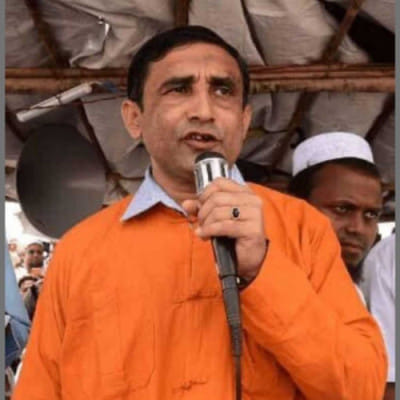Zeal for repatriation cost him his life

About four months before his assasination, Rohingya leader Mohib Ullah's organisation took an initiative to form repatriation committees in every refugee camp to facilitate the return of the refugees.
His Arakan Rohingya Society for Peace and Human Rights was forming these committees to make Rohingyas aware why they should go back home.
The initiative angered different Rohingya groups that maintain that refugees should return only after the Arakan state is liberated.
"As Mohib formed the committees, he started receiving threats. But Mohib had an unwavering determination," said a close aide of Mohib who was assassinated on Wednesday night.
Mohib and his followers formed several committees in the Lombashia camp and were about to expand it gradually to other camps.
Mohib, a leading voice for the Rohingya cause, was among the 700,000 refugees who came to Bangladesh in 2017 fleeing a violent military crackdown in Myanmar.
His efforts received widespread recognition after a group led by him organised a massive rally in 2019 inside a Rohingya camp.
Later that year, he was invited to Geneva to address the UN Human Rights Council and to the White House, where he spoke with then president Trump as part of a meeting with survivors of religious persecution.
Mohib's followers said his determination to return to Myanmar led to his death.
He recently established a connection with several anti-government groups in Myanmar that are also in favour of Rohingya repatriation, they added.
On Wednesday night, minutes before he was shot dead, Mohib spoke to several members of his organisation about returning to Myanmar, his wife Nasima told The Daily Star earlier.
His brother Ahmed Ullah said Mohib was scheduled to talk with several leaders of the National Unity of Government in Myanmar through WhatsApp on Friday.
Sixty-year-old Mohammad Sultan, a resident of camp-7 in Kutupalong, said the committees to popularise the idea of repatriation were supposed to be formed in his camp as well.
"Mohib was an optimist. He would always talk about going back to Myanmar. He became an icon of hope. Sadly, he had to be buried here, far from Myanmar," Sultan said.
These correspondents visited Kutupalong and Lombashia camps yesterday and talked to Rohingyas of different ages.
Most of them wished not to be named and said the gunmen who killed Mohib should be identified and punished for the sake of security at the camps and to send a message to the criminals that they are not above the law.
"There are bad people in the camps. If a towering figure like him gets killed then where is our safety?" asked Aziz Khan, a resident of camp-5.
He said law enforcers should play a more active role to ensure security at the camps.
"Security has now been beefed up at Mohib's house. If it was ensured earlier, he would not be killed," said a Rohingya man, adding that criminals were roaming everywhere in the camps but people would not dare raise their voice against them.
Meanwhile, police on Friday night arrested Abdus Salam, 30, of Lombashia camp and Ziaur Rahman, 32, of Kutupalong camp during raids on the camps, said Armed Police Battalion (APBn) officers.
Another Rohingya man was arrested that morning in connection with the assassination.

 For all latest news, follow The Daily Star's Google News channel.
For all latest news, follow The Daily Star's Google News channel. 



Comments